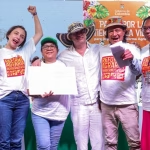
Against all Odds: How Local Communities Achieve Forest Conservation in Colombia
n early November, Indigenous communities in the Brazilian Amazon raised their voices, reminding us that without forests there is no future: “sem floresta, não há futuro”. During the UN Climate Change Conference (COP 30), global leaders discussed how to protect tropical forests as a collective effort. However, it ended without a binding agreement to stop deforestation. Given that tropical forests
























































